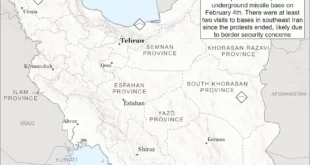 TEHRAN (FNA)- The start-up of the first reactor at Iran’s Bushehr nuclear plant will be “irreversible” by February next year, a senior Russian nuclear official said Monday.
TEHRAN (FNA)- The start-up of the first reactor at Iran’s Bushehr nuclear plant will be “irreversible” by February next year, a senior Russian nuclear official said Monday.
“Between December 2008 and February 2009 various technical measures will be carried out… that will make the physical start-up process of the first Bushehr reactor irreversible,” ITAR-TASS quoted the head of the Russian company working on the facility, Atomstroiexport, as saying.
Meanwhile, company spokeswoman Irina Yesipova noted the launch date will be determined after talks between Russian and Iranian nuclear officials this month.
The United States and its allies which accuse Iran of seeking to develop nuclear weaponry have criticized Russia for building the power plant.
Russia nonetheless states that the plant’s contract is in line with all international agreements aimed at preventing nuclear weapons proliferation.
Atomstroiexport which is the company working on the Bushehr nuclear plant also trains Iran’s nuclear specialists and delivers nuclear fuel to the plant’s reactor. The company has so far delivered eight fuel shipments to Bushehr.
Based on an $800-million contract signed in 1995, Russia agreed to complete one of two nuclear reactors in Bushehr within four years. The country has however failed to meet its deadline, citing the “sanctions imposed by Western powers” as the reason behind the delay in the construction of the power plant.
The United States and its Western allies accuse Iran of trying to develop nuclear weapons under the cover of a civilian nuclear program, while they have never presented any corroborative document to substantiate their allegations. Iran denies the charges and insists that its nuclear program is for peaceful purposes only.
Tehran stresses that the country has always pursued a civilian path to provide power to the growing number of Iranian population, whose fossil fuel would eventually run dry.
Iran is under three rounds of UN Security Council sanctions for turning down West’s calls to give up its right of uranium enrichment, saying the demand is politically tainted and illogical.
Iran has so far ruled out halting or limiting its nuclear work in exchange for trade and other incentives, insisting that it should continue enriching uranium because it needs to provide fuel to a 300-megawatt light-water reactor it is building in the southwestern town of Darkhoveyn as well as its first nuclear power plant in the southern port city of Bushehr.
Iran currently suffers from an electricity shortage that has forced the country into adopting a rationing program by scheduling power outages – of up to two hours a day – across both urban and rural areas.
Iran plans to construct additional nuclear power plants to provide for the electricity needs of its growing population.
The Islamic Republic says that it considers its nuclear case closed as it has come clean of IAEA’s questions and suspicions about its past nuclear activities.
Political observers believe that the United States has remained at loggerheads with Iran mainly over the independent and home-grown nature of Tehran’s nuclear technology, which gives the Islamic Republic the potential to turn into a world power and a role model for other third-world countries. Washington has laid much pressure on Iran to make it give up the most sensitive and advanced part of the technology, which is uranium enrichment, a process used for producing nuclear fuel for power plants.
Washington’s push for additional UN penalties contradicts a recent report by 16 US intelligence bodies that endorsed the civilian nature of Iran’s programs. Following the US National Intelligence Estimate (NIE) and similar reports by the IAEA head – one in November and the other one in February – which praised Iran’s truthfulness about key aspects of its past nuclear activities and announced settlement of outstanding issues with Tehran, any effort to impose further sanctions on Iran seems to be completely irrational.
The February report by the UN nuclear watchdog, the International Atomic Energy Agency, praised Iran’s cooperation in clearing up all of the past questions over its nuclear program, vindicating Iran’s nuclear program and leaving no justification for any new UN sanctions.
The UN nuclear watchdog has also carried out at least 14 surprise inspections of Iran’s nuclear sites so far, but found nothing to support West’s allegations.
The Vienna-based UN nuclear watchdog continues snap inspections of Iranian nuclear sites and has reported that all “declared nuclear material in Iran has been accounted for, and therefore such material is not diverted to prohibited activities.”
Many world nations have called the UN Security Council pressure against Iran unjustified, especially in the wake of recent IAEA reports, stressing that Tehran’s case should be normalized and returned to the UN nuclear watchdog due to the Islamic Republic’s increased cooperation with the agency.
 Eurasia Press & News
Eurasia Press & News



